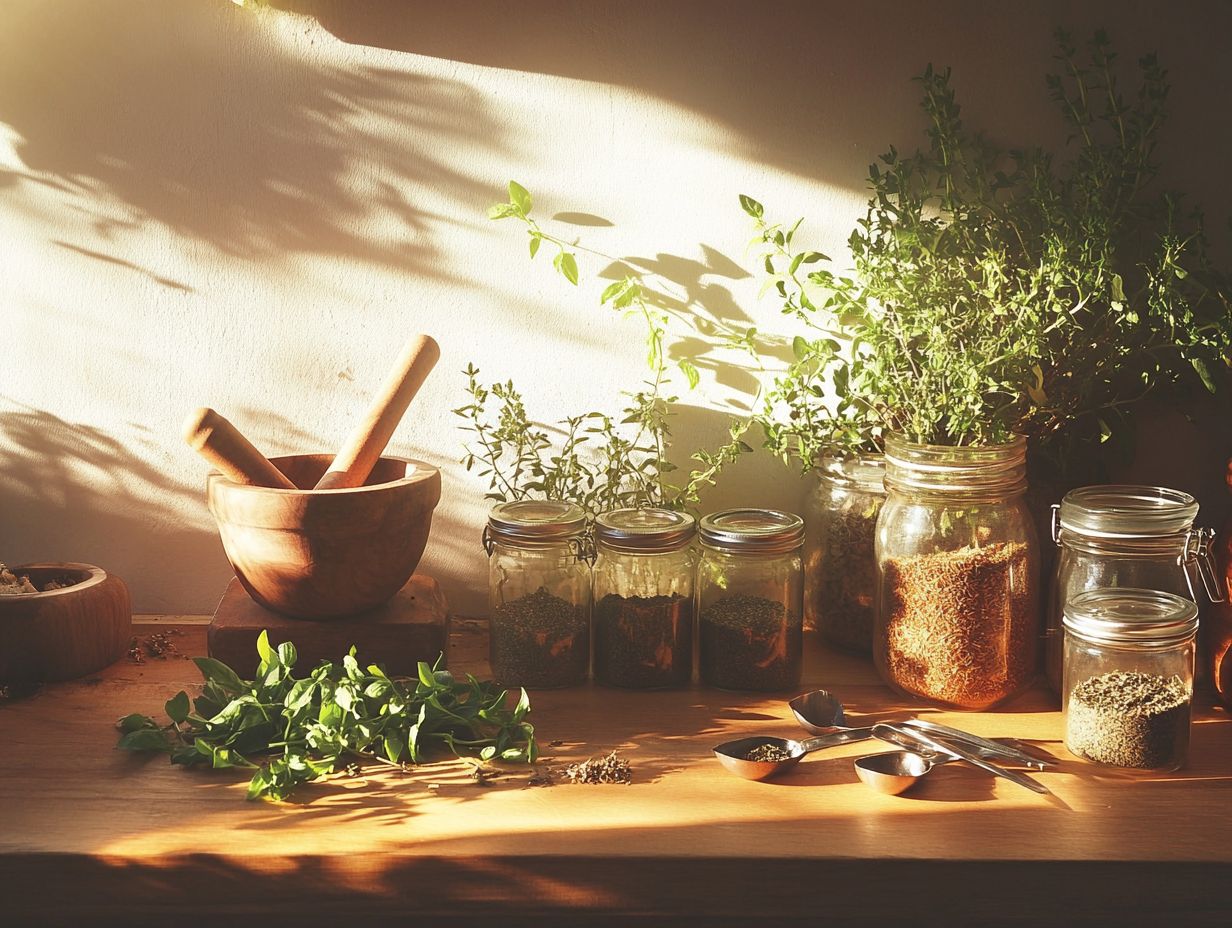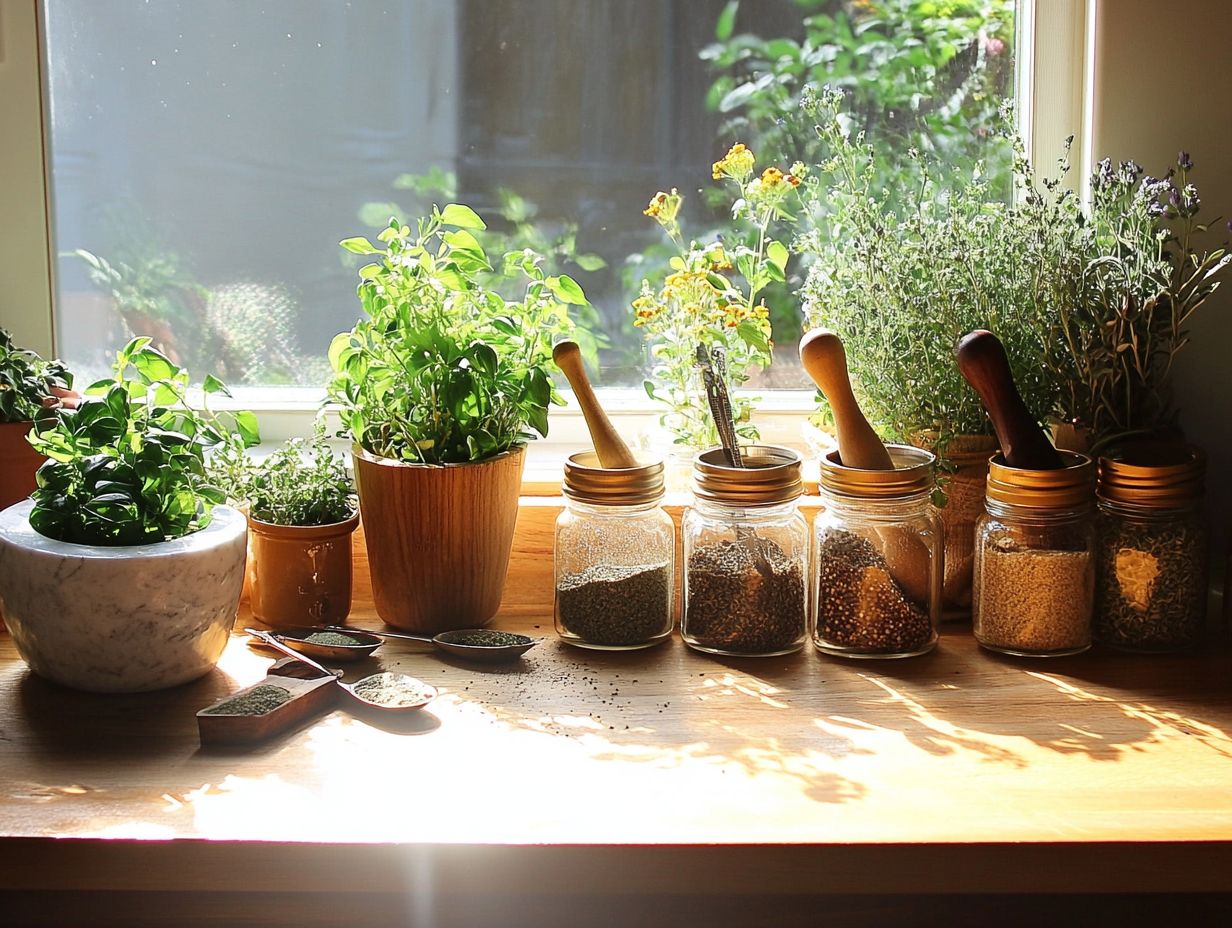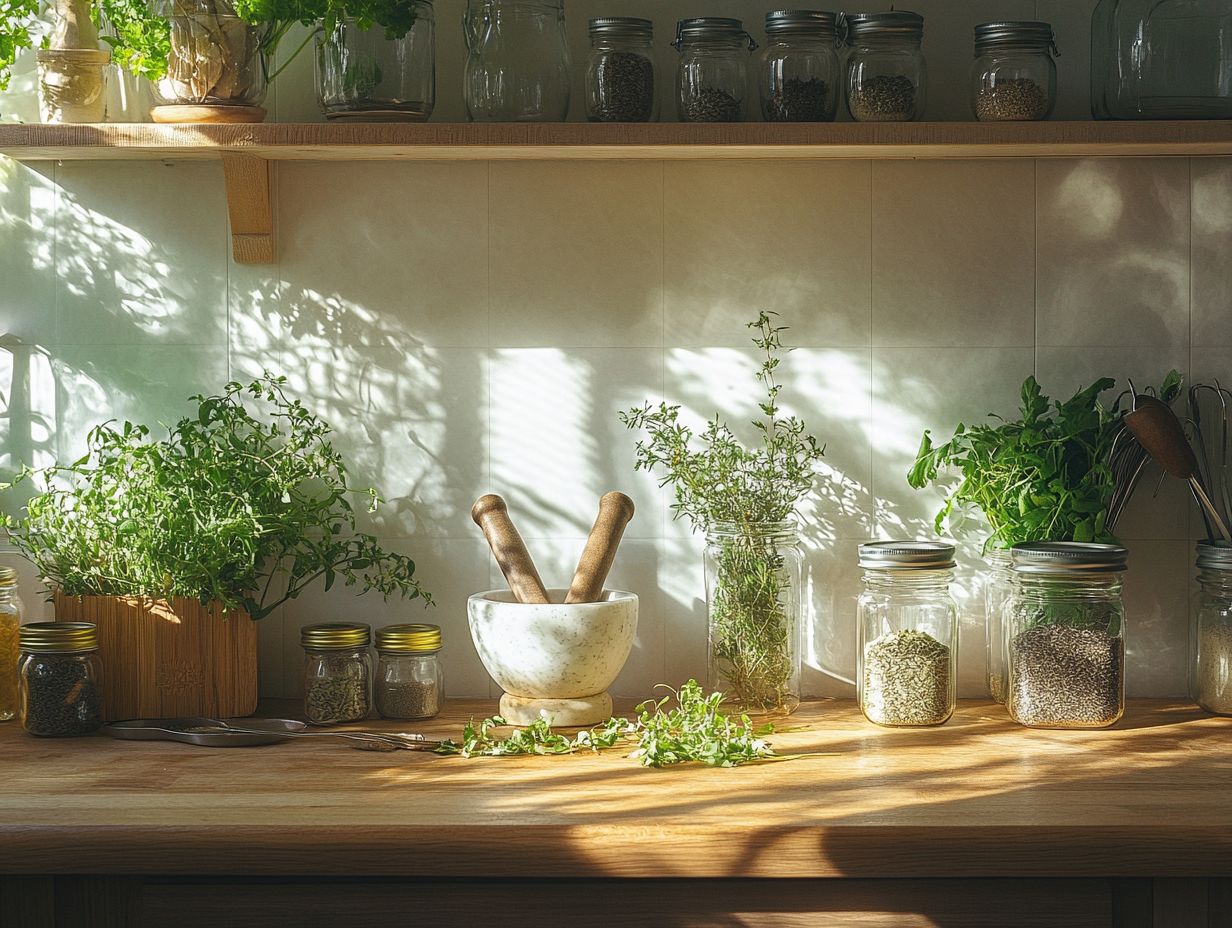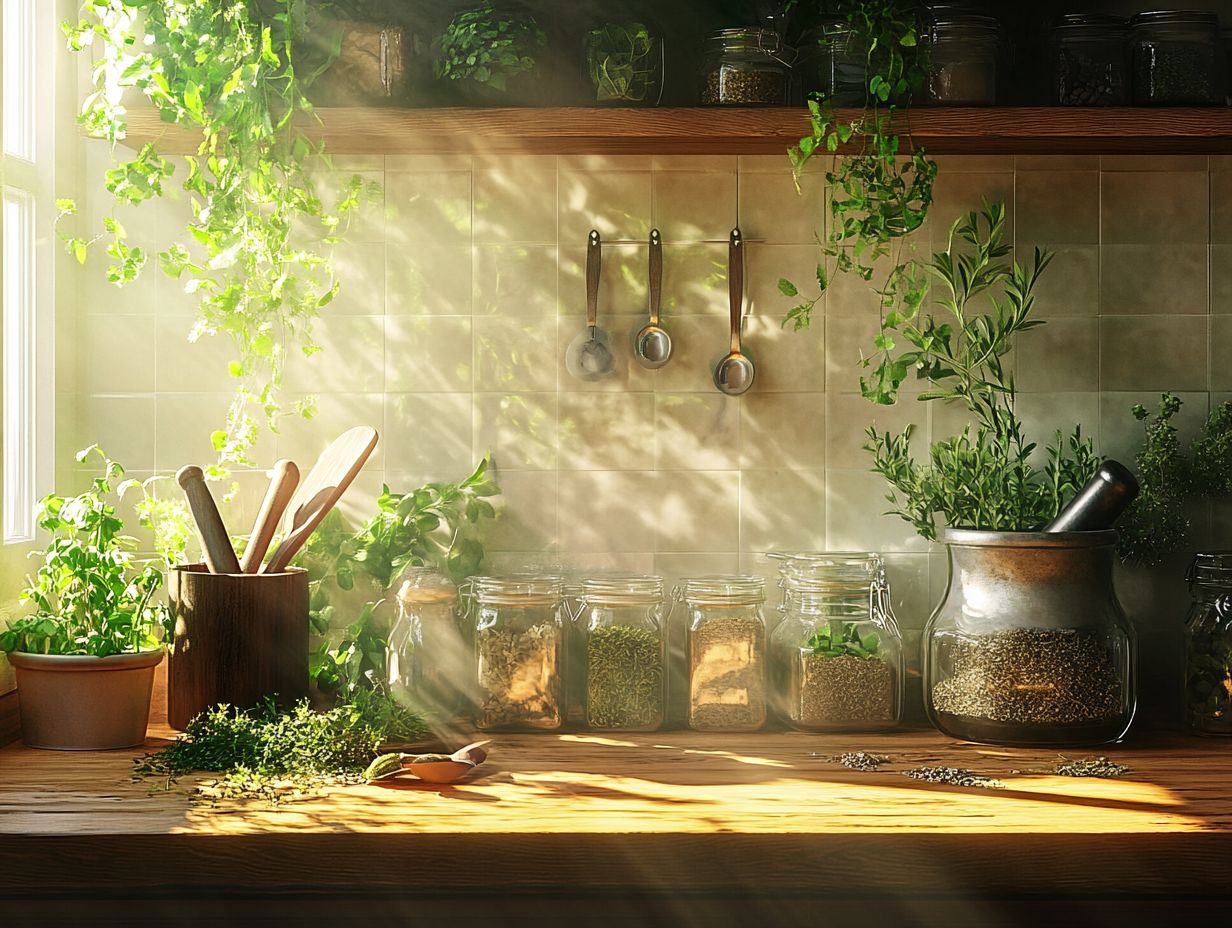How to Prepare Herbal Remedies at Home?
Herbal remedies have become increasingly popular as natural alternatives to conventional medicine, presenting a holistic approach to your health and wellness. Get excited to dive into the enriching world of herbal healing!
This guide will illuminate the benefits of preparing these remedies at home, showcasing how you can save money while maintaining quality control over your ingredients. You’ll discover the essential tools you need and get acquainted with commonly used herbs.
In this guide, you will find a detailed, step-by-step process for crafting your own remedies. Safety is paramount, and this guide will cover important precautions to keep in mind.
Contents
Key Takeaways:
- Save money and control ingredients by preparing herbal remedies at home.
- Familiarize yourself with essential tools and equipment needed for making herbal remedies.
- Ensure safe usage by following instructions and considering important precautions for herbal remedy preparation.

What are Herbal Remedies?
Herbal remedies, often known as herbal medicine, include a variety of natural solutions from various plants and herbs, each known for health benefits.
You probably know popular herbs like Kava, St. John’s Wort, and Echinacea, which have been used for centuries to prevent and treat ailments and enhance overall well-being.
However, many herbal remedies lack regulation by the FDA and may not have undergone thorough testing by reputable organizations like NIH MedlinePlus or the NCCIH.
Historically, herbal medicine has deep roots in ancient civilizations, serving as a cornerstone of healthcare practices, particularly in Traditional Chinese Medicine, which uses natural elements for healing, and Ayurveda, a holistic system from India.
Many people choose these remedies for conditions ranging from anxiety and depression to respiratory concerns and immune support. While herbal treatments can be beneficial, it s essential to remain mindful of potential side effects, which can vary significantly based on the herb and your unique health conditions.
Organizations like the FDA and NCCIH strive to offer guidance on the safety of these products, but you re encouraged to research thoroughly and consult healthcare providers to navigate the intricate landscape of herbal use effectively.
Benefits of Preparing Herbal Remedies at Home
Preparing herbal remedies at home provides numerous benefits, including cost-effectiveness and complete control over the ingredients you use. This control ensures both the safety and health benefits of the final product.
Many herbal enthusiasts value the opportunity to craft remedies tailored to their unique needs, utilizing high-quality ingredients and recipes that align with their health objectives.
Cost-Effectiveness and Control over Ingredients
One primary advantage of crafting herbal remedies at home is the cost-effectiveness it provides, allowing you to create herbal products without the hefty price tag of commercial options.
By making your own versions, you can significantly reduce expenses and ensure that each ingredient is carefully selected for quality and effectiveness. Unlike store-bought remedies, which often contain fillers and preservatives, home-prepared solutions offer complete transparency about their contents.
This gives you greater control over the ingredients and overall potency, allowing customization to meet your specific health needs.
Ultimately, this proactive approach enhances your personal health management and fosters a deeper connection with the natural ingredients you choose to incorporate.
Essential Tools and Equipment for Herbal Remedies

To prepare herbal remedies effectively, you ll need an assortment of essential tools and equipment. This includes basic kitchen utensils and specialized devices, such as capsule machines for creating convenient herbal supplements.
These tools streamline the extraction and combination of herbal ingredients, enhancing the quality and effectiveness of the remedies you produce.
Start your herbal remedy journey today!
Basic Supplies and Equipment Needed
When preparing herbal remedies, gather essential supplies and equipment. Think of jars for storage and a reliable blender for mixing herbal tinctures.
These foundational items include measuring spoons and cups. They ensure you use the correct proportions of herbs, which can impact the effectiveness of your concoctions.
A fine mesh strainer is critical for separating solids from liquids, especially for herbal teas or infusions. It allows for a smooth, delightful experience.
Quality labels help you organize and identify your creations, making them easily accessible and recognizable.
A mortar and pestle is also valuable. Grinding dried herbs into finer particles enhances their potency.
Commonly Used Herbs in Home Remedies
Explore the rich variety of herbs used in home remedies. Each herb offers unique health benefits that can prevent or alleviate ailments.
Renowned herbs like Lavender, Peppermint, and Chamomile are celebrated for their soothing effects. They are versatile in various herbal products.
Overview of Popular Herbs and Their Uses
An exploration of popular herbs reveals a wealth of uses. Take Lavender, known for its calming properties, or Peppermint, which aids digestion.
These botanicals have been treasured for centuries. They often appear in homeopathic preparations that promote holistic well-being.
- Chamomile is known for its gentle sedative effects, making it a go-to for alleviating anxiety and enhancing sleep quality.
- Echinacea stands out for its immune-boosting abilities. It is often used during cold and flu season to strengthen your body s defenses.
If you’re seeking digestive relief, Ginger shines not just for its flavor but for soothing nausea and supporting gastrointestinal health. It’s a versatile addition to any herbal concoction.
Step-by-Step Guide to Preparing Herbal Remedies

Follow this step-by-step guide to prepare herbal remedies. It s a great resource, whether you re just starting or a seasoned herbalist.
This guide ensures your herbal extracts are effective and safe.
With this approach, you can navigate herbal preparation confidently.
Instructions and Tips for Creating Effective Remedies
Creating effective remedies involves following specific guidelines. These tips elevate the quality of the herbal products you prepare.
First, sourcing high-quality herbs is essential. Choose organic varieties when possible to avoid harmful pesticides.
Identifying herbs correctly is crucial. Using the wrong species can lead to unwanted reactions.
Pay careful attention to your preparation method. Whether using infusions, decoctions, or tinctures, each technique highlights different properties of the herbs.
Conduct small batch tests to assess potency before scaling up.
Consult reliable resources or experienced herbalists for guidance. Be mindful of potential interactions with medications.
Safety Precautions when Preparing Herbal Remedies
Observing safety precautions is essential to minimize risks. Some herbs can interact with medications and lead to side effects.
Consult a healthcare provider before starting any new herbal regimen. This is crucial for ensuring safety and effectiveness in your approach.
Important Considerations for Safe Usage
When using herbal remedies, consider the quality and effectiveness of the products. Stick to recommended dosages to avoid unwanted side effects.
Purchase herbs from reputable sources that conduct thorough quality testing. This ensures contaminants are checked and the strength of active ingredients is verified.
Before starting any new herbal regimen, consult with a healthcare professional. This is crucial, especially for those with pre-existing health conditions or those taking medication, as interactions can happen unexpectedly.
Adjust your dosage based on your age, weight, and overall health for greater safety. Keeping a detailed log of effects and side reactions can provide valuable insights for you and your healthcare provider.
Frequently Asked Questions

What are herbal remedies?
Herbal remedies are natural treatments made from plants, herbs, and other natural ingredients. They help with various health issues and have been used for centuries in traditional medicine.
How do I know which herbs to use for my remedy?
Research and consult with a qualified herbalist before choosing herbs. Different herbs have unique properties and may interact with medications you’re taking.
Can I make herbal remedies at home?
Yes, you can make herbal remedies at home. Many ingredients are easily found at health food stores or online.
What supplies do I need to prepare herbal remedies at home?
Essential supplies include a mortar and pestle, a strainer or cheesecloth, and glass jars for storage. You may also need a double boiler and a digital scale for accurate measurements.
Are there any safety precautions I should take when preparing herbal remedies at home?
Take safety precautions when preparing your remedies. Wear gloves when handling potent herbs and wash your hands thoroughly afterward.
How long do homemade herbal remedies last?
The shelf life varies based on the ingredients and storage conditions. Some remedies last for months, while others are effective for only a few weeks. Always check for signs of spoilage before use.






